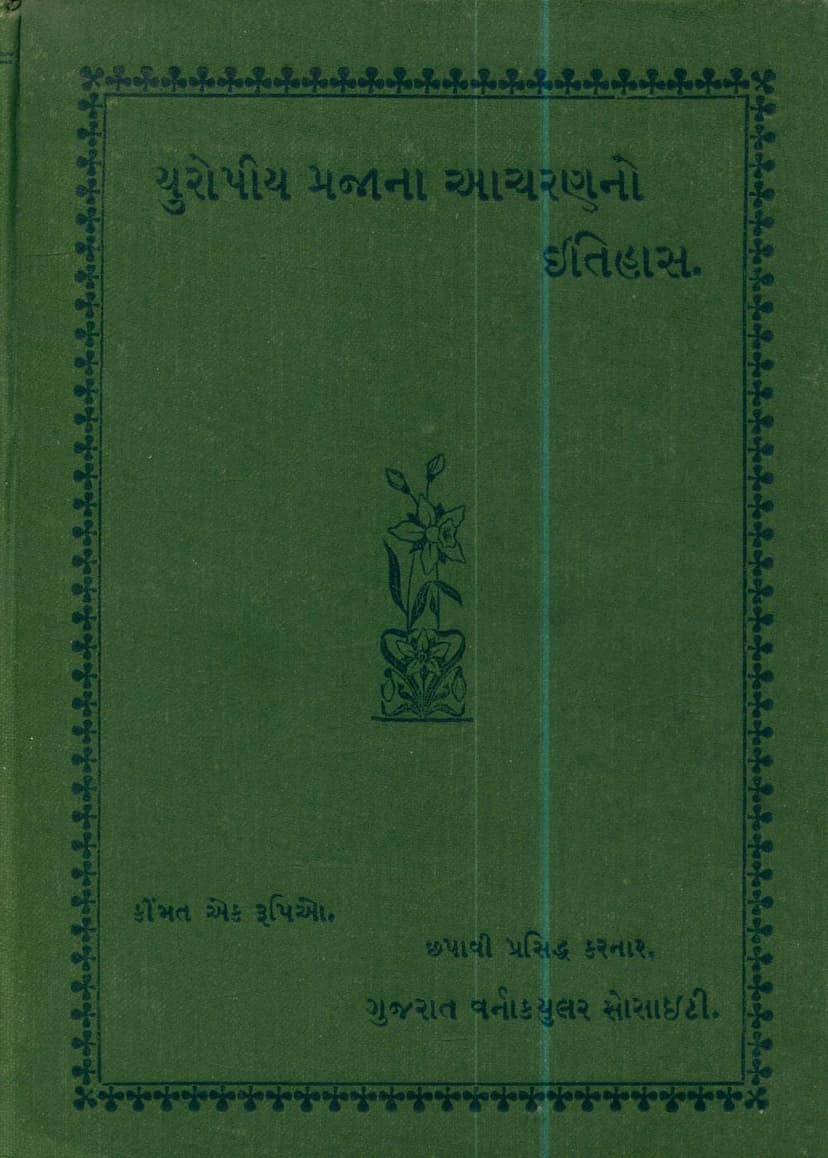Europiya Prajana Acharanno Itihas
Added to library: September 1, 2025

Summary
Here's a comprehensive summary of the Jain text "Europiya Prajana Acharanno Itihas" by Narbheshankar Pranjivan Dave, based on the provided pages:
Title: Europiya Prajana Acharanno Itihas (History of the Conduct of European Peoples) Author: Narbheshankar Pranjivan Dave, M.A. Publisher: Gujarat Vernacular Society Translation Context: This work is a translation of a book by William Edward Hartpole Lecky, likely his "History of European Morals." The Gujarati Vernacular Society is dedicated to promoting literature in Gujarat and has published several important works, including translations of prominent authors. Narbheshankar Pranjivan Dave is noted as a Professor of Moral Philosophy and English at Samaldas College, Bhavnagar, and is the author of other notable works.
Core Subject: The book explores the history of morality and ethical conduct among European peoples. It delves into the changes in moral standards and exemplars across different historical periods. The author emphasizes that morality is not static but evolves with time and societal context.
Key Themes and Arguments:
- Relativity of Morality: The text highlights how what is considered virtuous and virtuous behavior changes over time. For instance, what Pliny's Romans found acceptable in gladiatorial combat, the English of King Alfred's time would consider barbaric, and modern Englishmen would condemn entirely. While the principle of kindness remains good, its application and the definition of what constitutes kindness shift.
- Importance of Moral Exemplars: Different eras have emphasized different virtues as paramount. Patriotism, piety, generosity, and humility have each been at the forefront at different times, forming the foundation of moral conduct.
- Interplay of Influence and Practice: It's insufficient to just examine the ideals of moralists; historians must also observe how these ideals were actualized in the lives of the populace. Societal corruption can be reflected in the doctrines of its teachers, but sometimes teachers must challenge prevailing winds and preach against societal norms.
- Nature and Development of Morality: The author examines competing theories about the nature and development of morality. He investigates Stoic, eclectic, and Egyptian philosophies in relation to Roman history, showing how they influenced society and how morality naturally evolved.
- The Role of Christianity: The book analyzes Christianity's impact as a moral force in Europe. Lecky (as translated by Dave) distances himself from purely religious or dogmatic debates, focusing instead on Christianity's ethical contributions. He explores how Christianity interacted with pre-Christian societies, its transformation, the role of asceticism, the consequences of barbarian invasions, and its overall impact on societal morality.
- Specific Areas of Moral Evolution: The text touches upon the growing appreciation for the sanctity of human life, the history of charity, the development of hagiographies (stories of saints), the impact of asceticism on social and family ethics, the moral outcomes of monastic institutions, the morality of intellect, the conduct of people in declining Christian states and emerging barbarian kingdoms, the gradual veneration of practical status, and the initial stages of the Crusades.
- The Position of Women: The book concludes by examining the changing status of women and the moral questions surrounding the relationship between men and women in society.
Methodology: The author has carefully considered three main aspects when examining Europe's moral history from Augustus to Charlemagne:
- Nature of Morality and Ethics: He investigated competing philosophical principles regarding morality and showed which virtues were particularly suited to different stages of societal development. This helps determine how natural moral development was hindered or accelerated.
- Influence of Philosophy: He delved into the moral histories of pagan states, examining Stoicism, eclecticism, and Egyptian philosophies, and demonstrating how these influenced societal conditions and were in turn reflected in them. The effect on law and literature is also noted, along with an analysis of why imperial and philosophical efforts failed to eradicate corruption.
- The Impact of Christianity: The conquest of Britain and Christianity's spread is a focal point. The author strives to remain objective, focusing on Christianity's moral influence. He analyzes hindrances and aids to its propagation, its transformation after victory, the spirit of asceticism, the results of barbarian invasions, and its overall moral impact.
Overall Scope: "Europiya Prajana Acharanno Itihas" is a scholarly work that aims to provide a detailed and nuanced understanding of the historical development of European morality. It emphasizes the dynamic nature of ethics and the complex interplay of philosophical, religious, social, and political factors that shape it. The translation by Narbheshankar Pranjivan Dave makes this important work accessible to the Gujarati readership, contributing significantly to the intellectual richness of the region.